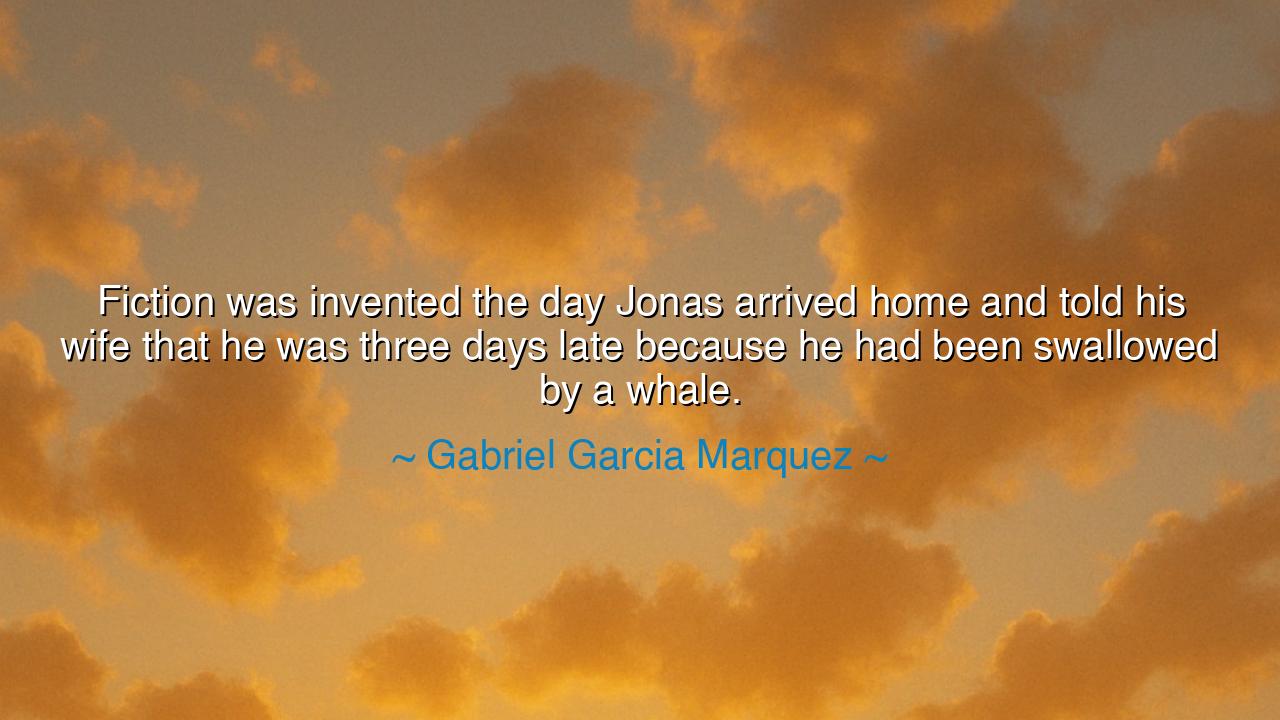
Fiction was invented the day Jonas arrived home and told his wife
Fiction was invented the day Jonas arrived home and told his wife that he was three days late because he had been swallowed by a whale.






In the radiant and mischievous words of Gabriel García Márquez, the master of magic and truth, we encounter a revelation about the soul of storytelling: “Fiction was invented the day Jonas arrived home and told his wife that he was three days late because he had been swallowed by a whale.” Within this single sentence lies the origin of all human imagination — the moment when reality met invention, when the human heart learned that truth could be shaped not only by fact, but by story. Márquez, ever the magician of words, was not merely joking about ancient myth; he was describing the dawn of art, the eternal human need to turn experience into meaning.
To speak of Jonas — or Jonah, as he is known in the ancient texts — is to recall one of the oldest and most mysterious tales in sacred scripture. The prophet who fled from divine command, swallowed by the great fish, cast into darkness, and then returned alive — this story stands as one of humanity’s first great narratives of transformation. But Márquez, with a wink of genius, asks us to imagine not the prophet within the whale, but the man after it — weary, disheveled, standing before his skeptical wife, spinning his incredible tale to explain his absence. In that instant, fiction is born — not as deceit, but as the human instinct to weave wonder from the threads of the impossible.
For what is fiction, if not the bridge between truth and imagination? Márquez’s words remind us that storytelling began not as a craft of writers, but as a survival of the soul. When humans first gathered around the fire, they told tales not to escape reality, but to transform it — to make the unbearable beautiful, the unknown familiar, and the forgotten eternal. From Jonah’s whale to Homer’s Odyssey, from the epics of Gilgamesh to the parables of every faith, fiction has always been our way of facing the world’s vastness — not with fear, but with creation. To invent is not to lie; it is to give truth a heartbeat.
Márquez himself was the high priest of this art. In his world of magical realism, the ordinary and the miraculous walked hand in hand — a woman ascending to heaven while hanging laundry, a village haunted by memories that never die, a war lasting a hundred years and a love that outlived them all. By invoking Jonah’s tale, Márquez was tracing his own lineage — for he, too, was a descendant of that first storyteller who dared to make sense of chaos through imagination. He saw that fiction is not falsehood, but the expansion of reality beyond its visible borders. To tell stories, then, is to perform the oldest act of faith: the belief that words can hold what life cannot.
Throughout history, the power of fiction has moved nations and softened hearts. Consider Miguel de Cervantes, who gave the world Don Quixote, the man who mistook windmills for giants. Cervantes, like Márquez, understood that humanity needs both madness and imagination to endure the weight of existence. His knight’s delusions were, in truth, his triumph — for through his dreams, he reminded the world that reality without imagination is a barren field. In this way, Cervantes and Márquez both trace their craft back to Jonah’s story — the moment when imagination first defied the tyranny of literal truth and dared to say, “This, too, could be real.”
There is also humor and humility in Márquez’s reflection. He reminds us that fiction was not born in temples or libraries, but in the humble spaces of human life — in the kitchen, the courtyard, the whispered excuses of a husband to his wife. It was born from love, fear, and the need to be believed. And so it remains today: every novelist, every poet, every child spinning dreams in the dark is merely echoing that ancient moment when Jonah stood before disbelief and found, in imagination, his only salvation.
The lesson, therefore, is timeless: do not fear the power of story, for it is the soul’s oldest truth. To imagine is not to deceive, but to create worlds in which the human heart can survive. Whether we write or listen, we are all heirs of Jonah — each of us carrying a tale too wild for the world to believe, and yet too meaningful to silence. In practical life, this means honoring the imagination — in ourselves, in our children, in the stories that give life color and depth. It means recognizing that what makes us human is not our logic, but our longing to shape the universe into meaning.
So remember, O seeker of truth, the wisdom of Gabriel García Márquez: that fiction began not with lies, but with love — not with deceit, but with wonder. When Jonah said he had been swallowed by a whale, he did more than explain his delay; he gave the world a myth, a metaphor, a miracle. And from that moment forward, every storyteller has done the same. For in every heart that dreams, there is still a whale — vast, mysterious, and filled with stories waiting to be told.






AAdministratorAdministrator
Welcome, honored guests. Please leave a comment, we will respond soon